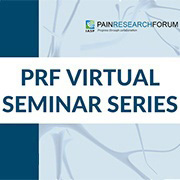Editor’s note: This is the 24th in a series of weekly PRF seminars designed to help keep the pain research community connected during the COVID-19 pandemic and to provide all members of our community with virtual educational opportunities. The seminar series is supported by the Center for Advanced Pain Studies at the University of Texas at Dallas, US.

On November 2, 2020, the IASP Pain Research Forum hosted a seminar with Erin Carey, MD, MSCR, University of North Carolina School of Medicine, Chapel Hill, US; Andrea Nackley, PhD, Duke University School of Medicine, Durham, US; and Andrea Rapkin, MD, David Geffen UCLA School of Medicine, Los Angeles, US A Q&A session moderated by Ingrid Harm-Ernandes, PT, WCS, BCB-PMD, Duke Health, Hillsborough, US, followed the presentation.
A recording of this webinar will soon be freely available to IASP members at the IASP Pain Education Resource Center (PERC).
Here are abstracts from the presenters
Vestibulodynia: Etiology, Diagnosis, and Current Clinical Management (Erin Carey)
Vestibulodynia (VBD) is the most common cause of sexual pain, affecting 16% of reproductive aged women in the United States. Women with VBD may seek help from multiple health care providers who may not be familiar with the symptoms and/or signs of the disorder. Even when the clinician recognizes the symptoms, standard evidence-based practice guidelines do not exist for the management of VBD. Here, I will review the prevalence of VBD, overlap with other chronic pain conditions, and clinically observed risk factors, and highlight the gaps in knowledge and current standard of care in VBD.
Vestibulodynia: Peripheral and Central Sensitization Mechanisms (Andrea Rapkin)
Accumulating literature suggests that VBD is associated with inflammation, neuroinflammation, and altered processing of sensory information. Potential underlying risks and triggers for development of inflammation, histological evidence for neuroinflammatory changes, psychophysiological studies of vestibular and distant pressure pain thresholds, and brain fMRI support for central sensitization and altered connectivity will be presented.
Vestibulodynia: Subtype-specific Biomarkers for Diagnosis and Treatment (Andrea Nackley)
Current treatment regimens for VBD are largely ineffective because of the condition’s uncertain etiology and heterogeneous clinical manifestations. Some women present with localized provoked pain restricted to the vaginal vestibule, while others present with VBD and chronic overlapping pain conditions (COPCs). Here, I will present our findings on novel clinical features and biological cytokine and microRNA pathways unique to women with VBD and to those with VBD plus COPCs. In addition, I will describe our ongoing clinical trialtitled “Vestibulodynia: Understanding Pathophysiology and Determining Appropriate Treatments” (Vestibulodynia: UPDATe), which seeks to provide new insights into the mechanisms that drive pain perception and treatment response in distinct VBD subtypes, and determine the efficacy of peripheral, central, and combined therapies in reversing this pain.
About the presenters
Erin T. Carey, MD, MSCR, is an assistant professor of obstetrics and gynecology and division director of Minimally Invasive Gynecologic Surgery at the University of North Carolina (UNC) School of Medicine. While in fellowship she also earned a master's of science in clinical research (MSCR) at the Gillings School of Public Health and completed an additional year of training in female pelvic pain disorders with pain medicine at UNC. She treats the full scope of gynecologic surgical and pelvic pain issues including the management of complex pelvic and vulvar pain disorders. As a physician scientist, she strongly believes in collaborative research efforts designed to improve diagnostic and treatment options for women with pelvic pain disorders.
Andrea Nackley, PhD, is an Associate Professor of Anesthesiology and Pharmacology at Duke University School of Medicine. She is director of the Translational Pain Research Laboratory, where her program marries pain neurobiology, behavioral pharmacology, and molecular genetics in mouse and human to better understand what causes chronic pain and how to effectively treat it. During the past 17 years, her expertise in this area has been applied to the study of how alterations in gene regulation, protein expression, and receptor signaling contribute to chronic overlapping pain conditions such as vestibulodynia. Key discoveries include: 1) determining human gene polymorphisms associated with experimental and clinical pain, 2) elucidating the molecular mechanism whereby pain-relevant polymorphisms lead to functional changes in protein expression and activity, and 3) identifying biomarkers that distinguish individuals with localized versus overlapping chronic pain conditions. Further, her lab was the first to demonstrate a critical role for peripheral adrenergic receptor beta-3 in the development of chronic pain and neuroinflammation, which remains a primary research focus. Dr. Nackley is an active leader in the field, participating in pain-relevant workshops and delivering invited lectures around the globe. She is a review editor for Frontiers in Pain Research. She was chair of the American Pain Society’s Early Career Forum, encouraging the professional development of our future leaders in pain research. In recognition of her scholarly activity in the pain field, she received the John C. Liebeskind Career Scholar Award from the American Pain Society.
Andrea Rapkin, MD, is a professor of obstetrics and gynecology at the David Geffen UCLA School of Medicine. She has published over 130 peer-reviewed articles, chapters, and invited reviews in the areas of chronic pelvic pain, vulvodynia, hormonally mediated mood disorders, and women’s reproductive health. Recent funded research addresses neuroimaging and biomarkers in vulvodynia. Dr. Rapkin was one of the first obstetrician-gynecologists to adapt the multidisciplinary pain management approach to the evaluation and treatment of women with pelvic and vulvar pain.
About the moderator
Ingrid Harm-Ernandes PT, WCS, BCB-PMD, has been a physical therapist for 36 years and began specializing in women’s health 24 years ago. Since 2001 she has worked for Duke University Health System where she presently treats a wide variety of pelvic patients in the urogynecology and physical therapy clinics. She is the Co-Director and mentor for the Women’s Health Physical Therapy Residency Program, responsible for Women’s Health team program development and participates in PFDN research projects. She is board certified in women’s health (WCS) and pelvic floor biofeedback. She has served on various committees for AUGS including serving as the Chair and Vice Chair for the APPTAH SIG for AUGS. She enjoys presenting on the importance of recognizing and assessing the pelvic musculoskeletal system. She has presented on pelvic physical therapy-related topics including sexual dysfunction, prolapse, pelvic pain, vulvar pain, urinary and fecal incontinence, and the mysteries of the musculoskeletal system for various organizations and societies nationally and internationally.
Join the conversation about the seminar on Twitter @PainResForum #PRFSeminar
We thank the Center for Advanced Pain Studies at the University of Texas at Dallas, US, for its support of the PRF seminar series.



